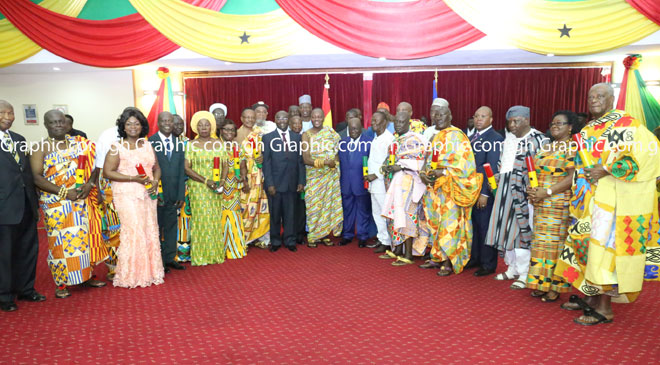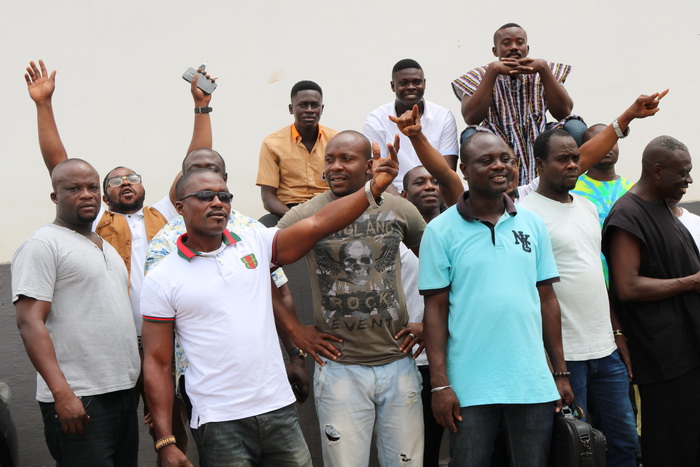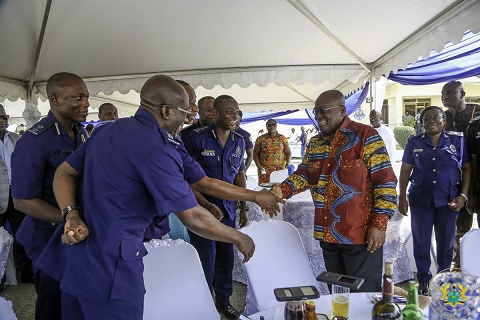
Celebrating Silver Jubilee of the Fourth Republic; Good, bad and ugly
The beginning of the year 2017 witnessed the installation of Nana Addo Dankwa Akufo-Addo as the fifth President of the seventh government of the fourth Republic. It was also around the same time that the sixth Parliament was dissolved, making way for the inauguration of the seventh Parliament under the fourth Republic.
Advertisement
Political activity
Before this historic feat, former President John Dramani Mahama had just lost the 2016 election to candidate Nana Akufo-Addo.
This is significant in that again, the nation had witnessed another smooth transfer of power from a ruling political party to an opposition party.
This is rare on the continent of Africa where politics is a do-and-die affair and it is the winner who is entitled to all the ‘’booty’’ which has popularly become known as the winner takes all.’
Speech highlights
There was, therefore, spontaneous jubilation and merrymaking in the stronghold of the ruling New Patriotic Party (NPP) in Kumasi during the swearing-in of the fifth President of the fourth Republic.
The President, in his speech, promised to protect the public purse and as the year rolled by, Ghanaians would be in a better position to assess the President on his inaugural speech to combat corruption and protect the public purse. The highlights of the speech included redefining the Ghanaian identity by urging Ghanaians not to be spectators but participate actively in the nation-building process.
The opposition accused the President of plagiarising his speech.
This dragged on for days, with government officials arguing that it was not what would put bread on the table for Ghanaians but the opposition insisted that as a new President, his actions must be impeccable so as not to betray the trust Ghanaians reposed in him by electing him as their President.

.jpg)

New minister nominated
Three days after his swearing-in, President Akufo-Addo hit the road running by naming his first batch of 13 ministers.
The list included Yaw Osafo-Maafo for the position of Senior Minister; Mr Albert Kan Dapaah, National Security; Mr Alan Kyerematen, Trade and Industry; Mr Ken Ofori-Atta, Finance; Dr Owusu Afriyie Akoto, Agriculture; and Mr Boakye Agyarko, Energy.
Security of the state
The second batch followed the next day with those on the list including Dr Anthony Akoto Osei, Monitoring and Evaluation; Mr Daniel Kwaku Botwe, Regional Re-organisation and Mobilisation; and Prof. Kwabena Frimpong Boateng; Environment, Science and Technology.
The third and final list of ministers nominated by the President was announced in less than a week of the President’s assumption of duty and this was seen as an achievement by a newly sworn-in President in the history of the country.
Third batch of ministers
The third list included Prof. George Gyan-Baffour, Minister at the Presidency in charge of Planning; Ms Catherine Ablema Afeku, Tourism, Arts and Culture, and Mr Mustapha Abdul Hamid, Information.
Less than three weeks after his swearing-in, President Akufo-Addo, on January 25, named Commissioner of Police (COP) David Asante Apeatu as the acting Inspector General of Police (IGP), demonstrating how the security of the state was dear to his heart.
General review
No sooner had the President been installed and the brouhaha about his speech had died down than another brouhaha started. This time, it was about the appointment of 110 ministers and their deputies.
The President, two days after his swearing-in, attended an inter-denominational thanksgiving service at his hometown, Kyebi, to thank God for his victory in the December 7 general election and his successful inauguration as the first Gentleman of the land.

Council of State
The President, despite the stance of the opposition about the number of his ministers which they claimed was going to cripple the economy, named`14 people as Council of State members.
They included Nana Otuo Siriboe 11, the Juabenhene, Mr Sam Okudjeto, a legal practitioner and former President of the Ghana Bar Association (GBA), Nana Kofi Obiri Egyir, the Sanaahene of the Oguaa Traditional Area.
110 Ministers
The creation of new ministerial portfolios by the President received mixed reactions from Ghanaians. While some described the creation as a strategic move to address specific national issues, others said it would be a drain on the national coffers.
Exciting moments
On February 15, 2017, the President of the National House of Chiefs of Togoland and Paramount Chief of Notsie, Togbe Agorkoli IV, paid a historic courtesy call on the President of Ghana, at the Flagstaff House.
Other important visits to the country
Around the same time, Senator Oppong Weah of Liberia paid a courtesy call on President Akufo-Addo to congratulate him on his election as the President of Ghana.
On February 17, King Mohammed VI of Morocco arrived in the country to begin a three-day working tour, during which far-reaching agreements were signed in agriculture, education and energy.
Economic activities
The President, on February 21, delivered his maiden State of the Nation address, during which he outlined his policies to address the economic challenges confronting the nation.
The reading of the budget provided the opportunity for the government to spell out its programmes of alleviating the suffering of the ordinary Ghanaian.
General review
The fight against galamsey was intensified under the Presidency of Nana Addo Dankwa Akufo Addo with the media spearheading the anti-galamsey crusade which yielded fruits.
The only setback was the killing of Major Mahama at Denkyera Obuasi which sent shock waves through the entire country.
All the daily economic activities and exciting social moments were, however, soiled by the impatience of some NPP party activists, including the Delta Forces.

Source of political vigilantism
During the campaign period in 1992, some “macho men,’’ under the guise of protecting party officials and gurus, constituted groups such as the ‘’Bolga Bull Dogs,‘’ the ‘’Delta Force’’, ’’ Azoka Boys’’ the “Volta Crocodiles’, ’among others.
In 2000 when the NPP took over the reins of government, the party’s offshoots took over tollbooths, places of convenience and lorry parks.
In 2008 when the NDC regained power it was payback time for the vigilante groups of the party to drive away those gangs and reap from those areas.
These events took place in violence and though civil society condemned the activities of the groups, they did little to call for their disbandment.
Matters got to a head when in 2016, the NPP took over political administration. The Tema tollbooth was attacked by a vigilante group from the party. Similar incidents took place at Tepa in the Ashanti Region.
The Delta Force
What was worse was when members of the Delta Force attacked the Security Coordinator of the Ashanti Region’s office in Kumasi and brutally assaulted the Coordinator and some staff of the office. That was not all, the same group also attacked a court where members of the group had been arraigned in Kumasi and forcefully freed suspects.
The action not only put the lives of the judge and staff of the court in danger but was also an affront to the Judiciary, the principle of rule of law and freedom and justice which have been pontificated by the same government as pillars of democracy.
Hooliganism
A former Chief of Defence Staff, Brigadier Nunoo-Mensah, said the development had resulted in the youth being enlisted by political parties for illegal activities and vigilantism, which he described as “political thuggery.”
He cautioned further that failure to deal with the phenomenon, which had been with Ghana since the country started practising politics, had resulted in the current experiences.
He was speaking at the third Accra Dialogue Series organised by the Institute of Law and Public Affairs (ILPA) and the Friedrich Ebert Stiftung (FES).
The topic for the third dialogue was: “The scars of vigilantism: A legal or a political question?”
“Rather than seeing it as a criminal activity and dealing with it as such, we gave it all kinds of colourful names. And no one has had the courage to deal with it until today,” he told his audience.
He noted that what had been happening since the inauguration of the New Patriotic Party (NPP) government in January 2017 was not new.
What was new, he pointed out, was the brazen courage and impunity with which those groups carried out their illegal activities, to the point of intimidating the courts.
Brig Nunoo-Mensah said the increase in political hooliganism was the result of the breakdown of discipline and values and the state’s inability to create jobs with the changing times.
Action by government
While these actions received condemnations from traditional rulers, the clergy, the public and civil society organisations such as, Imani, CDD, IEA, among others, the government rather could not come up boldly to ban the groups but rather hid behind the rule of law to allow the courts and the police to deal with the miscreants.
Some party stalwarts even went to the extent of defending the violent actions of such groups.

Police
The police, who are under the control of the Executive, find themselves constrained in handling these culprits because of the fear of being dealt with by politicians who protect these hooligans.
I remember an official of the GTZ, the German aid organisation at a seminar, admonish the police, calling on them to resist orders from politicians who order the arrest of persons as a show of power. The officer went on to advise the police to find out from the politician the reason why the person should be arrested and if they found the reason for the arrest to be unlawful, they should not carry out such orders.
I myself was a victim of such order when a Regional Minister ordered the police to place me in custody for no reason. It took the intervention of another officer from the same police station to stop a showdown between myself and a police officer who had asked me to enter the cell because of the order from the politician.
Under the circumstance, the police find themselves in a difficult situation when ordered by politicians to carry out their unlawful orders. There is, therefore, the need to educate both politicians and the police about such unlawful orders to save both from embarrassment.
The Judiciary
It is also quite ludicrous that the very Judiciary which suffered some of the atrocities of the vigilante groups also treated some of the culprits who appeared before the court with kid gloves by imposing soft sentences.
It was no wonder that the Asantehene Otumfuo Osei Tutu II took a swipe at the Judiciary when he criticised it for the judgement handed over to the culprits who attacked the court in Kumasi to forcefully free their colleagues.
Otumfouo Osei Tutu queried the quality of justice delivered in the sentence handed to members of the pro-NPP vigilante group, the’’ Delta Force,” when the court slapped only a fine on the convicts.
He wondered if justice was served in that ruling and asked “if even it has been served, the question may be asked whether the quality of justice was served?”
Speaking at the 16th annual Chief Justice Forum in Kumasi on Tuesday, November 21, 2017, he asked: If someone steals a goat and is fined GH¢5,000 and additionally slapped with a jail term, how can people who invade a courtroom, overpower the security, release suspects and put the life of the judge and staff in danger be fined only GH¢1,800 and be discharged?’’
Civic activism
The Chairperson of the National Peace Council, the Most Rev. Prof. Emmanuel Asante, in his submission, urged all Ghanaians to rise up against the phenomenon of vigilantism.
He said legal political acts ought to be distinguished from illegal acts.
The Director in charge of Academics and Research at the Kofi Annan International Peacekeeping Training Centre (KAIPTC), Dr Kwesi Aning, in his contribution, said vigilantism was a “festering sore threatening the security of the country,” while a lecturer at the Political Science Department of the University of Ghana, Dr Alidu Seidu, said “if care is not taken, Ghana will face vigilantism capture.”
Suggestions
Those who condemned the phenomenon were unanimous that vigilantism was criminal and proffered measures to deal with it, including prudent economic management for jobs, improvement in social values, civil society and media activism on them.
Given the public outcry about vigilantes, it was also suggested that the groups be disbanded and banned completely from the political landscape for the sake of peace, security and stability of the country.




